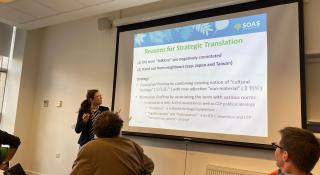
Breadcrumbs navigation
Gender, race and the intersections of precarity - a new blog series
In 2021, BISA and the Political Studies Association (PSA) released a comprehensive report on career trajectories for academics in politics and international relations departments in the UK.
This jarring but important account reveals a number of wide gaps: unequal rates of promotion for men and women and white scholars and scholars of colour, a higher proportion of men in our discipline compared to others like Sociology and Law, ongoing barriers around admissions, funding and hiring for Black and minority ethnic students and women staff. This report also numerically articulates what so many of us know and experience every day – our discipline is very white, very male and often lacks adequate support systems to recruit and retain talented women and minority ethnic scholars.
However, in sharing our reactions to the report and thinking through many of the equality, diversity and inclusion efforts of BISA and the PSA, many of us felt that our stories – the everyday interactions and first-hand knowledge as underrepresented staff and students – still remained untold. In order to truly generate solutions to many of these complex issues, we need faces and experiences alongside these key statistical findings.
"Our discipline is very white, very male and often lacks adequate support systems to recruit and retain talented women and minority ethnic scholars."
From this dialogue, a new collective was formed. As the pandemic-related ongoing uncertainty continues on, we look to each other for community, for collaboration and for a shared commitment to improving the conditions of our disciplines. To move our vision forward, we will share some of our own stories through a blog series and bring together women academics for a special event at the BISA 2022 Conference.
In the lead up to #BISA2022, our collective of postgraduate, early and mid-career women academics will present a special blog series that considers the uniqueness of the gendered and racialised experiences of women in academia. These blogs draw on our own experiences and evidence-based research on the following:
- Dr Orly Siow, Lecturer in the Politics of Gender at Newcastle University, writes about makeshift remedies to institutional problems in a piece entitled “Why sticking plasters are not enough.”
- Dr Sana Rahim, Lecturer in Criminology at Sheffield Hallam University, blogs about mental health and the disproportionate burden of self-care for underrepresented women in academia.
- Dr Jana Fey, Lecturer at University of Sussex, and Sofia Doyle, PhD Candidate in Politics at University of Manchester, discuss precarity and the pressures felt by postgraduate and early career researchers in their blog “Navigating the in-between.”
- Dr Sanja Djerasimovic, Research Fellow in the College of Humanities at the University of Exeter, highlights the links between UK higher education policies and precarity for international scholars in her post titled “Equally precarious? Precarity, excellence, and the prospect of an academic career for a ‘non-traditional’ scholar.”
- Dr Terri-Anne Teo, Lecturer in the Politics of Race and Ethnicity at Newcastle University, and Dr Elisa Wynne-Hughes, Senior Lecturer in International Relations at Cardiff University, will continue this conversation about the experiences of migrant academics with their piece “Precarity and Academic Migration: Support, Dissent and Banalities.”
- Dr Skyler Hawkins, Lecturer in the Politics of Race and Ethnicity at Newcastle University, will bring together these topics and reflect on her own autoethnographic experiences as a first-year lecturer in the current political and social climate.
"We will share some of our own stories through a blog series and bring together women academics for a special event at the BISA 2022 Conference."
At #BISA2022, we will host a special event, “Gender, race and the intersections of precarity – An interactive workshop.”
During the workshop, which includes a mentoring and networking luncheon with women academics of all ranks in politics and international relations, small group discussions and a collective session to generate ideas and solutions to many of our day-to-day and institutional issues, we hope to facilitate much-needed conversations and generate both ideas and solutions that all allow for greater diversity, access and inclusion in international studies scholarship. For more information on this interactive workshop and to register for the free event, please visit the event page.
As we reflect on what survival means for our discipline, our research and ourselves in a post-pandemic era, we hope that this blog series and workshop will serve as the beginning of a new, supportive and empowering collective of women academics in BISA and PSA.


